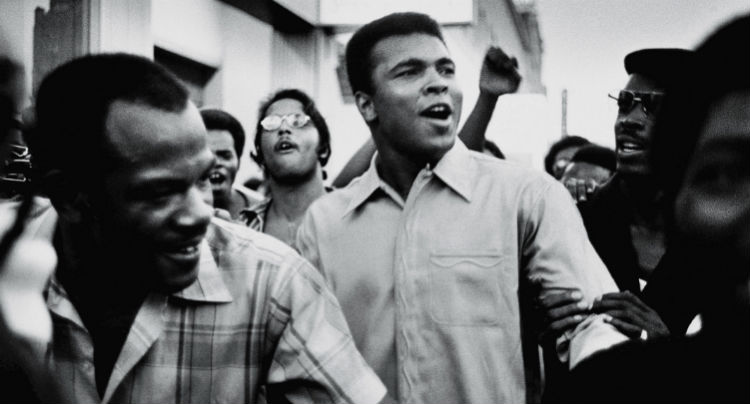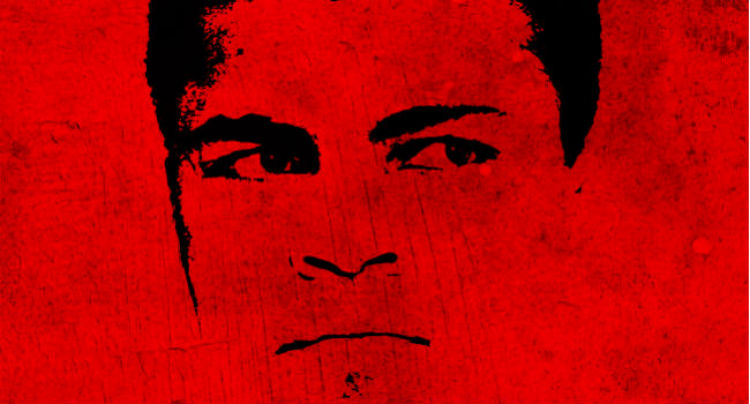
Explores the boxing legend's tumultuous, controversial past.

Explores the boxing legend's tumultuous, controversial past.
Muhammad Ali is one of the most enduring social and pop culture figures of our time; he’s almost universally revered as an American icon and one of the best boxers to step into the ring . It’s quite fashionable these days for fight fans (like myself) to refer to him by his birth name, Cassius Clay. “Muhammad Ali? Oh yeah, Cassius Clay was the greatest!” In fact, if you ever see someone wearing a Muhammad Ali t-shirt, odds are it actually says “Cassius Clay” on it. The truth is, Muhammad Ali detests “Cassius Clay”, considers it to be his “slave name”, and most likely doesn’t appreciate those popular t-shirts at all. We love him, but do we really know him?
Bill Siegel’s The Trials of Muhammad Ali is a riveting, illuminating examination of a man who’s lauded for his triumphs in the squared circle, but in fact faced and overcame much, much more trying struggles outside of the ring; he survived a whirlwind of criticism following refusal to participate in the Vietnam War, relentless attacks on his religious beliefs, and was even forced to hang up his gloves and hand over his championship belt by the U.S. government, sending him into exile for three years.
Brilliantly, the film opens with a startling juxtaposition of two pieces of archival Ali footage. First, we see Ali on a talk show in the 1968, with television host David Susskind viciously berating Ali’s character, calling him a “disgrace”, a “simplistic fool”, and a “pawn” (Ali had just refused induction into the military). For those unfamiliar with this period in Ali’s life (like myself), the clip is a shocker. The next piece of footage jumps to 2005, and we see an Ali we’re more familiar with; President George W. Bush presents Ali (Parkinson’s disease in full effect) with the Medal of Freedom, an award created to honor civilians for aiding war efforts. It’s a wonderful illustration of just how long and tumultuous a journey it’s been for “The Greatest” in terms of his public perception.

To examine Ali’s tumultuous, controversial past in the public eye in the ’60s and ’70s, Siegel uses an enormous wealth of archival footage (Ali was never one to shy away from cameras). The controversy began with Ali’s conversion to Islam and his affiliation with the Nation of Islam, who gave him his new name. The maelstrom surrounding Ali reached a new high when he openly dodged the draft. “How can I shoot them poor people? Just take me to jail!” In astonishing footage that demonstrates Ali’s true brazenness, he stands on at a podium on a college campus, surrounded by hundreds of white students, and proclaims that white people are his enemy. He screams in a white student’s face: “You’re talking to me about some draft…I’m not gonna help nobody get something negroes don’t have. If I’m going to die, I’ll die right now, fighting you!”
The other storytelling tool Siegel uses are interviews he’s conducted with a handful of people who were close to Ali at the time, from Louis Farrakhan, to his former wife, Khalilah Ali, to Tom Krattenmaker (who convinced the Supreme Court to keep Ali out of jail), and more. Siegel’s choices of interviewees are strategic, as each provide a unique, invaluable perspective on Ali’s life at the time (Ali himself isn’t interviewed and is only present in the archival footage). Siegel’s interview with Ali’s brother, Rahaman Ali, is tremendously moving, as he speaks so lovingly about his brother and with such great admiration that he’s moved to tears. Siegel’s melding of the interview and archival footage is seamless and affecting, and the film is excellent from front to back.
Despite there being countless documentaries on Ali’s in-ring career, this is surprisingly the first time his life has been examined from this angle. It’s a profile of a man with such character, courage, and durability of spirit that he withstood the wrath of a nation long enough for its people to learn to love him again. Unwavering and uncompromising, Ali is a symbol of strength, and The Trials of Muhammad Ali is the best filmic representation of his true character.